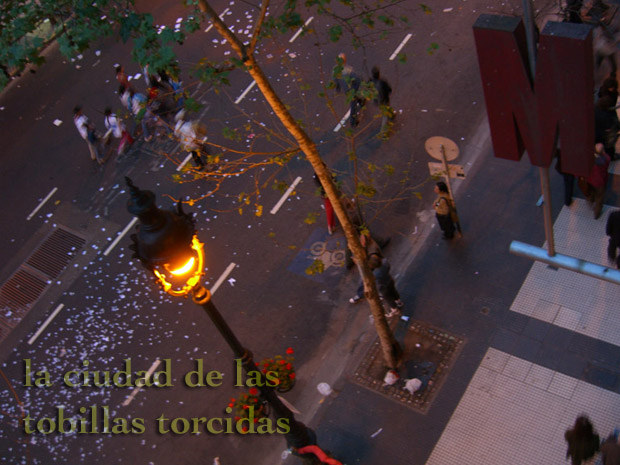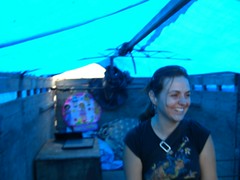arriba, abajo, al centro, a dentro
Last night was one of the more miserable I´ve experienced.
After spending the day meandering around a relatively uninspiring Uyuni, I had a beer at an empty gringo bar and made my way to the bus about a half hour before departure. It was actually one of the more comfortable Bolivian buses I´ve been on, and left only a few minutes late, at around 8:05pm.
All the roads surrounding Uyuni, and headed north to La Paz are gravel and dirt, and it´s been dry around here lately. The main roads are banked and planed regularly by crews with steamrollers, etc. I´ve seen a couple of teams settling the dust as such. At around 8:50, the bus suddenly slipped off the shoulder and plunged to the left, all of us at 45 degree angle to the ground. I instinctively shifted to the right, as though my meager weight might prevent the bus from tipping. We hit the desert floor (about a four foot descent) and promptly came to a halt. Everyone poured out of the bus and we could immediately tell that this bus was going nowhere anytime soon. Front and rear wheels were halfway covered in sand, and the terrain was all brush and sand hills. Ten or so dudes gave it a tokenist´s effort to push it out of the sand, but with no result.
Another La Paz-bound bus stopped then, and there was a great commotion as to whether people would try to board that bus, or wait for our own. Two other Americans and I made the mistake of waiting until the very last minute to get on the second bus (thinking there wasn´t room, and that perhaps a more reasonable solution would be presented), and found ourselves standing in the narrow aisle with three or four others without seats.
Long story short, we spent the next 7 hours alternately standing, crouching and laying on the floor, straddling other people´s bags and getting elbowed in the face by restless sleepers.
During the couple rest room breaks we watched stray dogs lap diesel fuel out of puddles beneath the buses. I saw one drinking grease straight out of a bucket next to a stand where a woman was frying llama steaks. Someone puked into a urinal next to me.
When we finally got to Oroua (?), about three hours south of La Paz, they unloaded everyone, and a new bus showed up. There was a frantic movement for everyone to exchange their existing tickets for new ones. It was then that I almost began killing people. It seemed clear for a moment that I and the four other people who had been forced to stand for the past seven hours would continue to do so for the remainder of the trip. The crowd was too frenzied, there certainly was no reason to the order the drivers were assigning seats. We vowed to one another in broken spanish, however, that regardless of what our tickets said (or didn´t say) we were walking onto the next bus and sitting down in the first seats that presented themselves.
Fortunately, everyone but one person (a local, making only the three-hour trip) had a seat on the final bus, and I managed to fall asleep relatively quickly after the well-rested mob had stopped their reinvigorated chatter (all the ruckus was apparently much more amusing to those who´d been able to sleep the past several hours).
Then, at 6:30am this morning, at the same time that the driver´s assistant came around to collect the newest tickets, a papaya-seed-selling fuckwad televangelist stood up and began what was to be a 45 minute schpiel ("...just two a day and it thins the blood, prevents diabetes, invigorates the heart, the head, the lungs, improves sexual function, tastes great, that´s right señores, it even tastes great! and did I mention the cost of this amazing natural remedy? Well, let´s not talk about price just yet, did I mention it thins the blood?..").
I had seen these snake oil charlatans on the street in La Paz before, and had found the entire display charming and entertaining, right down to the handing out of individual papaya seeds, and the looks of actual wonder on the faces of passersby, but when this guy stood up this morning (and people actually bought the stuff!)...
Well, I haven´t slept yet. And I don´t feel very well. But tomorrow is Christmas, so happy happy happy happy
After spending the day meandering around a relatively uninspiring Uyuni, I had a beer at an empty gringo bar and made my way to the bus about a half hour before departure. It was actually one of the more comfortable Bolivian buses I´ve been on, and left only a few minutes late, at around 8:05pm.
All the roads surrounding Uyuni, and headed north to La Paz are gravel and dirt, and it´s been dry around here lately. The main roads are banked and planed regularly by crews with steamrollers, etc. I´ve seen a couple of teams settling the dust as such. At around 8:50, the bus suddenly slipped off the shoulder and plunged to the left, all of us at 45 degree angle to the ground. I instinctively shifted to the right, as though my meager weight might prevent the bus from tipping. We hit the desert floor (about a four foot descent) and promptly came to a halt. Everyone poured out of the bus and we could immediately tell that this bus was going nowhere anytime soon. Front and rear wheels were halfway covered in sand, and the terrain was all brush and sand hills. Ten or so dudes gave it a tokenist´s effort to push it out of the sand, but with no result.
Another La Paz-bound bus stopped then, and there was a great commotion as to whether people would try to board that bus, or wait for our own. Two other Americans and I made the mistake of waiting until the very last minute to get on the second bus (thinking there wasn´t room, and that perhaps a more reasonable solution would be presented), and found ourselves standing in the narrow aisle with three or four others without seats.
Long story short, we spent the next 7 hours alternately standing, crouching and laying on the floor, straddling other people´s bags and getting elbowed in the face by restless sleepers.
During the couple rest room breaks we watched stray dogs lap diesel fuel out of puddles beneath the buses. I saw one drinking grease straight out of a bucket next to a stand where a woman was frying llama steaks. Someone puked into a urinal next to me.
When we finally got to Oroua (?), about three hours south of La Paz, they unloaded everyone, and a new bus showed up. There was a frantic movement for everyone to exchange their existing tickets for new ones. It was then that I almost began killing people. It seemed clear for a moment that I and the four other people who had been forced to stand for the past seven hours would continue to do so for the remainder of the trip. The crowd was too frenzied, there certainly was no reason to the order the drivers were assigning seats. We vowed to one another in broken spanish, however, that regardless of what our tickets said (or didn´t say) we were walking onto the next bus and sitting down in the first seats that presented themselves.
Fortunately, everyone but one person (a local, making only the three-hour trip) had a seat on the final bus, and I managed to fall asleep relatively quickly after the well-rested mob had stopped their reinvigorated chatter (all the ruckus was apparently much more amusing to those who´d been able to sleep the past several hours).
Then, at 6:30am this morning, at the same time that the driver´s assistant came around to collect the newest tickets, a papaya-seed-selling fuckwad televangelist stood up and began what was to be a 45 minute schpiel ("...just two a day and it thins the blood, prevents diabetes, invigorates the heart, the head, the lungs, improves sexual function, tastes great, that´s right señores, it even tastes great! and did I mention the cost of this amazing natural remedy? Well, let´s not talk about price just yet, did I mention it thins the blood?..").
I had seen these snake oil charlatans on the street in La Paz before, and had found the entire display charming and entertaining, right down to the handing out of individual papaya seeds, and the looks of actual wonder on the faces of passersby, but when this guy stood up this morning (and people actually bought the stuff!)...
Well, I haven´t slept yet. And I don´t feel very well. But tomorrow is Christmas, so happy happy happy happy


